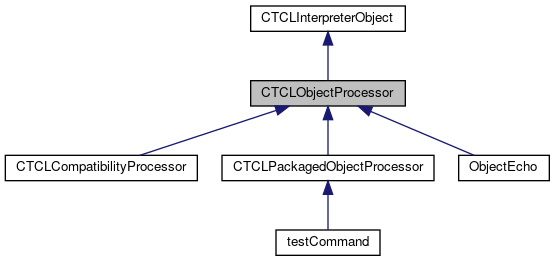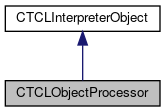#include <TCLObjectProcessor.h>


Public Member Functions | |
| CTCLObjectProcessor (CTCLInterpreter &interp, std::string name, bool registerMe=true) | |
| virtual | ~CTCLObjectProcessor () |
| void | Register () |
| Tcl_Command | RegisterAs (std::string name) |
| void | unregister () |
| void | unregisterAs (Tcl_Command token) |
| std::string | getName () const |
| Tcl_CmdInfo | getInfo () const |
 Public Member Functions inherited from CTCLInterpreterObject Public Member Functions inherited from CTCLInterpreterObject | |
| CTCLInterpreterObject (CTCLInterpreter *pInterp) | |
| CTCLInterpreterObject (const CTCLInterpreterObject &aCTCLInterpreterObject) | |
| CTCLInterpreterObject & | operator= (const CTCLInterpreterObject &aCTCLInterpreterObject) |
| int | operator== (const CTCLInterpreterObject &aCTCLInterpreterObject) const |
| CTCLInterpreter * | getInterpreter () const |
| CTCLInterpreter * | Bind (CTCLInterpreter &rBinding) |
| CTCLInterpreter * | Bind (CTCLInterpreter *pBinding) |
Protected Member Functions | |
| virtual int | operator() (CTCLInterpreter &interp, std::vector< CTCLObject > &objv)=0 |
| virtual void | onUnregister () |
| void | bindAll (CTCLInterpreter &interp, std::vector< CTCLObject > &objv) |
| void | requireAtLeast (std::vector< CTCLObject > &objv, unsigned n, const char *msg=0) const |
| void | requireAtMost (std::vector< CTCLObject > &objv, unsigned n, const char *msg=0) const |
| void | requireExactly (std::vector< CTCLObject > &objv, unsigned n, const char *msg=0) const |
 Protected Member Functions inherited from CTCLInterpreterObject Protected Member Functions inherited from CTCLInterpreterObject | |
| CTCLInterpreter * | AssertIfNotBound () |
Detailed Description
This class encapsulates the Tcl_Obj command processor interface. we needed to start doing this because my understanding is that the argc/argv version of the interface is getting deprecated when Tcl/Tk 9.0 comes out. If you already have extensive command sets that use the argc/argv interface, fear not, as an adpator has been written to allow these to pretty much work once recompiled.
Constructor & Destructor Documentation
◆ ~CTCLObjectProcessor()
|
virtual |
Destruction just requires unregistering the command. The deletion callback will undoubtably be triggered.
Member Function Documentation
◆ bindAll()
|
protected |
bindAll Binds all the objects in a vector to an interpreter.
- Parameters
-
interp - reference to the interpreter. objv - reference to vector of objecgts.
◆ getInfo()
| Tcl_CmdInfo CTCLObjectProcessor::getInfo | ( | ) | const |
Return information about this command from the Tcl interpreter.
- Returns
- Tcl_CmdInfo
- Return values
-
copy of struct from Tcl_GetCmdInfo().
- Exceptions
-
CStateException - If not registered. CTCLException - If Tcl_GetCommandInfo fails.
◆ getName()
| string CTCLObjectProcessor::getName | ( | ) | const |
Return the name of the command. If not registered, it's safe just to return m_Name, if registered, some script might have renamed us so we'll ask Tcl to tell us what our command name is.
◆ onUnregister()
|
protectedvirtual |
Called when the command is being unregistered. This is overridable, but not necessary. Our default action is to do nothing.
Reimplemented in CTCLCompatibilityProcessor, and ObjectEcho.
◆ Register()
| void CTCLObjectProcessor::Register | ( | ) |
Register this object as an object command. Note that if the command is already registered, we throw a CStateException.
- Exceptions
-
CStateException thrown if already registered.
◆ RegisterAs()
| Tcl_Command CTCLObjectProcessor::RegisterAs | ( | std::string | name | ) |
Register the command with a specific name. This allows objects to field more than one command.
◆ requireAtLeast()
|
protected |
requireAtLeast Thrown std::string exception if the size of an objv is less than the specified number of parameters.
- Parameters
-
objv - command object vector. n - Minimmum size required of objv msg - Pointer to the message string to use if the default is not desired.
◆ requireAtMost()
|
protected |
requireAtMost Same as requireAtLeast but there can be no more than n parameters.
- Parameters
-
objv - command object vector. n - Maximum size required of objv msg - Pointer to the message string to use if the default is not desired.
◆ requireExactly()
|
protected |
requireExactly Same as above but there must be exactly the requested number of params.
- Parameters
-
objv - command object vector. n - exact size required of objv msg - Pointer to the message string to use if the default is not desired.
◆ unregister()
| void CTCLObjectProcessor::unregister | ( | ) |
Delete a command.
- Exceptions
-
CStateException - if the object is not deleted. CTCLException - if the delete failed.
◆ unregisterAs()
| void CTCLObjectProcessor::unregisterAs | ( | Tcl_Command | token | ) |
Unregister the command object from a specific command name
- Parameters
-
name - THe name to unregister as.
The documentation for this class was generated from the following files:
- libtclplus/include/tclplus/TCLObjectProcessor.h
- libtclplus/tclplus/TCLObjectProcessor.cpp
 1.8.13
1.8.13